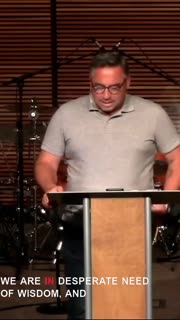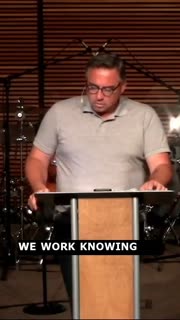Embracing Wisdom: The Key to Effective Leadership
Devotional
Sermon Summary
Bible Study Guide
Sermon Clips
### Quotes for Outreach
1. "Boy, we live in a noisy and crowded and confusing world filled with a lot of shouting of opinions and punditry and so-called expert views all the time. There's a lot of misinformation because of that. With the rise of electronic media, social media, we all have the news and ways to communicate and self-publish. All within our pockets on our phones." [03:44] (24 seconds)
2. "We are in desperate need of wisdom, and we are in desperate need of leaders that carry wisdom and wise leadership. And so this morning, we're going to look at... Some of these ideas of wisdom and leadership. It's amazing how the wrong leadership or a lack of wisdom among decision makers is so crucial to us." [04:10] (26 seconds)
3. "All of us are leaders at some level. And all of us are also followers at some level. And so maybe you lead at work. Maybe you have a position where you have people underneath you at work. Maybe you're a parent and you're leading kids and your family. At worst case scenario, you are to lead yourself." [06:49] (21 seconds)
4. "We work knowing that we are to work as unto the Lord in all that we do. We also know there's a time to rest. There's a time to down tools. There's a time to rest in who God says we are. We look to him for our identity, for our strength, for our guidance, for our wisdom." [31:39] (18 seconds)
5. "May we look to Jesus once more. May we not grow weary. May we not grow faint hearted. But may we live with wisdom and joy as we follow him." [59:35] (14 seconds)
### Quotes for Members
1. "The fool can't hide eventually the inclinations of their heart. And it's interesting here that he describes it as a deficiency of the heart. In other words, folly means that there's something lacking in the human heart. What we've seen in Ecclesiastes and what we know in Proverbs, also written by Solomon, is what? What is lacking in the heart? What is the beginning of wisdom? The fear of the Lord. That's what's lacking. In the heart of the fool." [14:06] (32 seconds)
2. "The wise will go one way to the right. The fool will go the opposite direction. They're antithetical. They're antithetical kind of paths to one another. Their heart directions are inclined in different ways. No, he says it's the man's heart inclines him to the right, but a fool's heart to the left. Even when the fool walks on the road, he lacks sense. And he says to everyone that he is a fool." [12:04] (28 seconds)
3. "The words of a wise man's mouth win him favor, but the lips of a fool consume him. The beginning of the words of his mouth is foolishness, and the end of his talk is evil madness. A fool multiplies, though no man knows what is to be, and who can tell him what will be after him? A toil of a fool wearies him, for he does not know the way to the city." [32:59] (24 seconds)
4. "Jesus states in Mark 10, and he directs those who are his followers. Otherwise, he says, it shouldn't be so among you. Whoever would be great among you would be your servant. Whoever would be first among you, would be the slave of all. Jesus's idea of wisdom is it's upside down. We think the leader should be the head of the table. We think he should be first in line." [41:26] (27 seconds)
5. "May we look to the fruit of the Spirit, and then compare to what the reaction of the world is trying to provoke in us. May he be our North Star. May he be our guiding wisdom in every moment of what we do. So that all that we do, all that we say, all that we eat, all that we drink, our bread, our wine, our work, our leading as parents, our leading in the community, our leading in civic responsibilities as some of us you have, may all of that be led with the wisdom of Christ." [58:46] (36 seconds)
Ask a question about this sermon
1. "Boy, we live in a noisy and crowded and confusing world filled with a lot of shouting of opinions and punditry and so-called expert views all the time. There's a lot of misinformation because of that. With the rise of electronic media, social media, we all have the news and ways to communicate and self-publish. All within our pockets on our phones." [03:44] (24 seconds)
2. "We are in desperate need of wisdom, and we are in desperate need of leaders that carry wisdom and wise leadership. And so this morning, we're going to look at... Some of these ideas of wisdom and leadership. It's amazing how the wrong leadership or a lack of wisdom among decision makers is so crucial to us." [04:10] (26 seconds)
3. "All of us are leaders at some level. And all of us are also followers at some level. And so maybe you lead at work. Maybe you have a position where you have people underneath you at work. Maybe you're a parent and you're leading kids and your family. At worst case scenario, you are to lead yourself." [06:49] (21 seconds)
4. "We work knowing that we are to work as unto the Lord in all that we do. We also know there's a time to rest. There's a time to down tools. There's a time to rest in who God says we are. We look to him for our identity, for our strength, for our guidance, for our wisdom." [31:39] (18 seconds)
5. "May we look to Jesus once more. May we not grow weary. May we not grow faint hearted. But may we live with wisdom and joy as we follow him." [59:35] (14 seconds)
### Quotes for Members
1. "The fool can't hide eventually the inclinations of their heart. And it's interesting here that he describes it as a deficiency of the heart. In other words, folly means that there's something lacking in the human heart. What we've seen in Ecclesiastes and what we know in Proverbs, also written by Solomon, is what? What is lacking in the heart? What is the beginning of wisdom? The fear of the Lord. That's what's lacking. In the heart of the fool." [14:06] (32 seconds)
2. "The wise will go one way to the right. The fool will go the opposite direction. They're antithetical. They're antithetical kind of paths to one another. Their heart directions are inclined in different ways. No, he says it's the man's heart inclines him to the right, but a fool's heart to the left. Even when the fool walks on the road, he lacks sense. And he says to everyone that he is a fool." [12:04] (28 seconds)
3. "The words of a wise man's mouth win him favor, but the lips of a fool consume him. The beginning of the words of his mouth is foolishness, and the end of his talk is evil madness. A fool multiplies, though no man knows what is to be, and who can tell him what will be after him? A toil of a fool wearies him, for he does not know the way to the city." [32:59] (24 seconds)
4. "Jesus states in Mark 10, and he directs those who are his followers. Otherwise, he says, it shouldn't be so among you. Whoever would be great among you would be your servant. Whoever would be first among you, would be the slave of all. Jesus's idea of wisdom is it's upside down. We think the leader should be the head of the table. We think he should be first in line." [41:26] (27 seconds)
5. "May we look to the fruit of the Spirit, and then compare to what the reaction of the world is trying to provoke in us. May he be our North Star. May he be our guiding wisdom in every moment of what we do. So that all that we do, all that we say, all that we eat, all that we drink, our bread, our wine, our work, our leading as parents, our leading in the community, our leading in civic responsibilities as some of us you have, may all of that be led with the wisdom of Christ." [58:46] (36 seconds)










